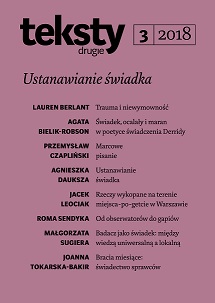Antysemityzm jako element konstytutywny polskiego habitusu
Anti-Semitism as a Constitutive Element of the Polish Habitus
Author(s): Romana KolarzowaSubject(s): Culture and social structure , Social differentiation, History of Antisemitism, Sociology of Religion, Identity of Collectives
Published by: Instytut Badań Literackich Polskiej Akademii Nauk
Keywords: anti-Semitism; religious hatred; cultural patterns; collective identity;
Summary/Abstract: Kolarzowa argues that Polish anti-Semitism is a continuous phenomenon that cannot be divided into “anti-Judaism” and “anti-Semitism”. Using the triangulation method, she indicates that all European anti-Semitism is embedded in traditional theological narratives and the resulting social options. She also discusses the reasons behind this continuity of Polish anti-Semitism, including the specificity of Poland’s social structure and the nobility’s objectives in instrumentalizing anti-Semitic discourses. Anti-Semintism was supposed to provide an inclusive option to the lower-ranking groups, while the term ‘nation’ was reserved for the nobility. This explains the prominent role of clergy in this narrative: the clergy was the only group capable of effectively shaping a collective identity of underprivileged social strata and presenting Judaism as an “antimodern,” so that anti-Semitism was associated with the identity of the modern nation.
Journal: Teksty Drugie
- Issue Year: 2018
- Issue No: 3
- Page Range: 227-240
- Page Count: 14
- Language: Polish
- Content File-PDF

